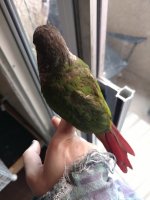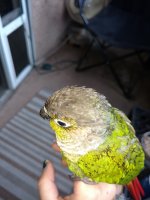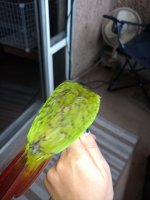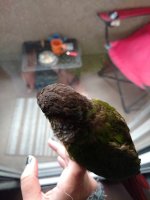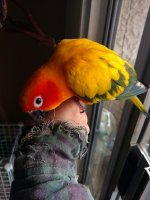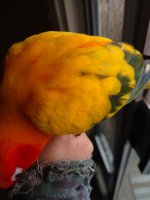Atous
Strolling the yard
- Joined
- 9/8/15
- Messages
- 76
Hello my lovelys,
I have two birdies, a Greek cheek and a sun. Pepe, the sun, is two now and Flit, the green cheek, is about 6 months. My boyfriend and I have noticed that one or maybe both are barbering their feathers (a term I just discovered). Flits got chewed up feathers all over his back and Pepe's got some on his shoulders. Because they're on Pepe's shoulders I'm thinking it's Flits work but Pepe does tend to bite the hair off my head.
How can I find out who's the trouble maker? What can I do to encourage them to stop? And how long until I know we've been successful?
They sleep together in a big cage because Flit would be restless all night until we let him sleep with Pepe. They're fed Harrison's, so I don't think nutrition is a problem. Maybe bordom? I've slacked off alot with training and I'm finding it difficult to work with them because Pepe wants to steal all the snacks and do all the tricks. Flit also seems very content to sit on their tree and chew shoe laces, where as Pepe has to be the center of attention. Pepe can fly but Flit really hasn't molted any old clipped flight feathers so he flutters short distances and runs around the couch. I'm sure this is alot of unnecessary detail but maybe it'll help, maybe I'm missing something or doing something I shouldn't that another perspective could spot.
I have two birdies, a Greek cheek and a sun. Pepe, the sun, is two now and Flit, the green cheek, is about 6 months. My boyfriend and I have noticed that one or maybe both are barbering their feathers (a term I just discovered). Flits got chewed up feathers all over his back and Pepe's got some on his shoulders. Because they're on Pepe's shoulders I'm thinking it's Flits work but Pepe does tend to bite the hair off my head.
How can I find out who's the trouble maker? What can I do to encourage them to stop? And how long until I know we've been successful?
They sleep together in a big cage because Flit would be restless all night until we let him sleep with Pepe. They're fed Harrison's, so I don't think nutrition is a problem. Maybe bordom? I've slacked off alot with training and I'm finding it difficult to work with them because Pepe wants to steal all the snacks and do all the tricks. Flit also seems very content to sit on their tree and chew shoe laces, where as Pepe has to be the center of attention. Pepe can fly but Flit really hasn't molted any old clipped flight feathers so he flutters short distances and runs around the couch. I'm sure this is alot of unnecessary detail but maybe it'll help, maybe I'm missing something or doing something I shouldn't that another perspective could spot.

